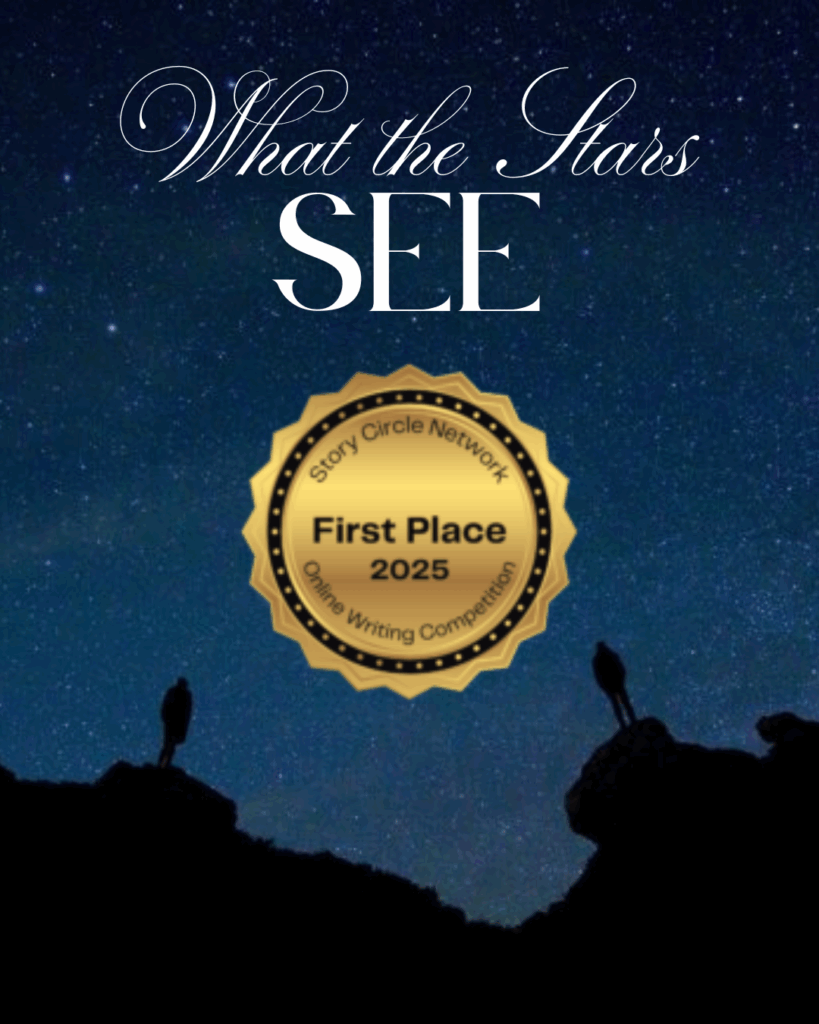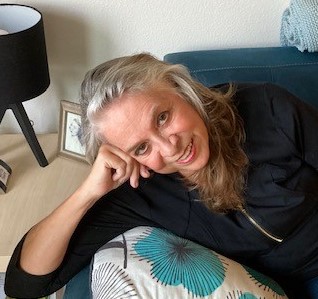
What the Stars See
 Note: I wrote this piece some years ago for a small college writing competition – and won first place!
Note: I wrote this piece some years ago for a small college writing competition – and won first place!
And an update: this piece just won First Place in an online competition put on by Story Circle Network – thank you SCN for honoring women’s stories.

“We too, like trees can shake off our dead leaves and begin again.” ― A.Y. Greyson
“I don’t want to do this, but I have to,” he said. He held me tight for a moment, and then the taxi arrived.
I watched him roll his suitcase down the driveway, greet the driver, get in the backseat. With the interior light on, I could see his strong profile, resolute, staring straight ahead. The light went off, and I wondered if, in the safety of darkness, he allowed himself to have one last look at me. If he did, what did he see? A woman standing in her nightgown in an open doorway at 1:00 a.m. Hollow eyes, wet cheeks, arms hanging limp at her sides. A woman he loved? A woman he hated? A woman he already felt no connection to?
The taxi started to roll, I could hear the sound of the engine diminishing. Through the leafy oleanders I could see the taillights disappearing. At any moment I thought they might flash brighter red as he said, “Stop! I changed my mind.” But they continued out of view. At any moment I thought the growl of the engine might grow louder as he said, “Turn around please! I’m not going.” But the night was silent except for the lonely calls of birds, and the only light was the vast ceiling of tiny stars in the sky. Stars that have seen it all.
In school I studied Erik Erikson’s Stages of Psychosocial Development. I learned how the things that happen in our childhoods can impact us for the rest of our lives. How unmet needs for safety, attachment, industry and self-esteem can damage our ability to succeed or to form healthy bonds. Yet we have relationships anyway. We wear masks to cover our holes and leave only those for eyes, food and air. And when we come to our partners in those masks, with all the hidden voids just waiting to be revealed, the relationships can continue horribly, or end terribly.
Erikson’s message is that at each stage there may be human tasks that we couldn’t master. Because our parents weren’t perfect, they did it as it was done to them. They visited their developmental holes upon each other and us, however much they didn’t mean to. Raw sores with jagged edges and unhealed infections. And then we inherit their wounds and bring them to our lovers and children.
But I have to believe that there is hope. The only solution I know involves work. The work of healing ourselves, filling those holes. The work of tending to those ragged tags of emotional gangrene. It hurts. It can be ugly. It can mean picking off scabs, making them bleed again, sometimes letting the poison pus out. Magic can’t do it. Only work.
My lover who left is very smart, but not smart enough to know that he needs to do the work. He runs. Even when he stays here.
Work can mean different things. Counseling, sometimes medicine. Spirituality, nature. Meaningful labor. Helping those less fortunate. Choosing quality friends and lovers. Healthy care of our bodies. Nurturing touch. Talking. But the healing has to fit the trauma. If he did not attach with his mother, then his job is not going to fill the hole where that first loving bond should have been. If she were abandoned by her father, then sacrificing for her men is not going to give her the sustenance she has most needed.
I’m no genius, but I will be heading back to work, because learning and then trying are what have brought me the farthest in my quest to be better. As much as I want to, I hope I won’t ask him to come back, because calling him back when he hasn’t done the work would only end the same way.
I still ache for him, though. Just like in the songs, everything reminds me of us. That tapas restaurant where we giggled over chorizo and olives and too much wine. The time in Yosemite, the river so cold that he heated water and washed my hair. Earthquakes and rainy days. His hearty laugh; his brooding anger. His voice at my ear, my soft moans into his neck.
I know it will take time, but eventually the hurt will fade, molecule by molecule, like the lights of his cab slowly rolling away.
I know because the stars that have seen everything tell me it is so.

This is such a beautiful story of love and loss, memory and resilience. At the same time, it teaches us something important. Thank you for sharing this!
And thank you for taking the time to write!
This is a wonderful story! The way you explore acceptance and the journey of working through heartbreak is deeply moving. It’s a testament to how we all, in our own ways, have faced similar moments of letting go and healing. Your writing captures that universal experience with grace and warmth.
I’m glad you were moved by my story.
This piece really moved me. As a college student just beginning to understand how complicated love, identity, and healing can be, your writing felt both poetic and painfully real. I could feel the weight of the moment you described — standing in the doorway, watching him leave — and the silence that follows. It’s not just about a breakup, but about all the memories, hopes, and wounds that come with it.
I’ve only just started learning about things like Erikson’s stages in my psychology class, but your reflections made them feel so much more human than a textbook ever could. It’s one thing to study the idea that childhood experiences affect adult relationships, and another to see how that plays out in someone’s real emotional life. The way you described people bringing their unmet needs into relationships — even without meaning to — was honest and eye-opening.
I also appreciated your focus on healing. You didn’t sugarcoat it. You said it’s hard, messy, and takes work — which honestly feels like such a powerful reminder, especially in a world that sometimes promises quick fixes. Your list of what that work can look like — therapy, community, self-care, choosing the right people — gave me a lot to think about.
The way you described still loving him, still aching, but also choosing not to go back to the same pattern felt incredibly strong. That kind of self-respect isn’t always easy to hold onto, and your honesty about that struggle made the message even more powerful.
And the image of the stars watching quietly as you go through it all? That really stayed with me. There’s something comforting in the idea that the universe has seen people survive heartbreak before — and heal — and still find love and meaning on the other side.
Thank you for sharing such a beautiful and personal story. It gave me a lot to reflect on — not just about relationships, but about how much work it takes to grow into someone who can love in a healthy way.
I have to admit this is one of my favorite pieces of writing. Thank you so much for reading and appreciating it. For a young person still on the cusp of adult life, you are such a deep thinker. I hope this serves you well in finding meaningful, healthy love.